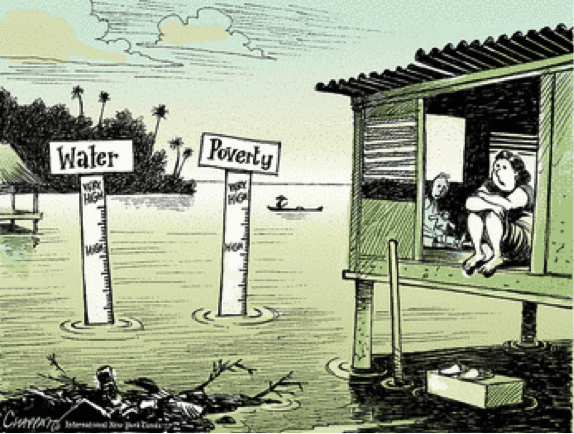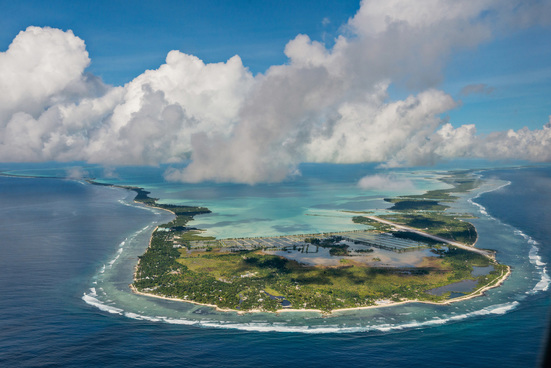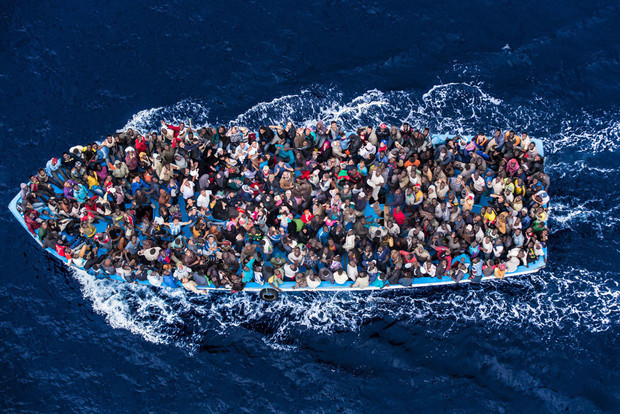|
It is no secret that island nations will suffer greatly due to rising sea levels. Because of their low elevation and small size, many small island states are threatened with partial or virtually total inundation by future rises in sea level. In addition, increased intensity or frequency of cyclones could harm many of these islands. Furthermore, its interference in local agricultural and other income-generating activities could intensify social inequalities and cause a worldwide humanitarian crisis. The most disturbing demonstration of inequality is that small island developing states that face the greatest negative effects of climate change, have contributed less than 1% to the global stock of greenhouse gasses now in the atmosphere. I learned about the case of Kiribati, a small island nation in the Central Pacific ocean, more in-depth as I was reading the latest issue of the National Geographic magazine. I found out that most of Kiribati does not lie more than 3 meters above sea level and rising sea levels have already contaminated groundwater with salty water that is unfit for consumption. Furthermore, the scarcity of a vital resource like fresh water interferes with local agriculture patterns, damages the local economy and wipes out cultural practices. In, Kiribati, the increased salinity of the groundwater has hindered the growth of bwabwai, the prestige food of Kiribati culture that is used in feasts by the community. Although the government is helping farmers switch to crops that are more resistant to saltwater, this shift in agricultural patterns reflects the impact on climate change on the sustenance and cultural practices of island populations like Kiribati. While the impact of climate change has already started to affect the current population of Kiribati, the future looks even more bleak. Recently, President Anote Tong revealed that his Cabinet had endorsed a plan to buy nearly 6,000 acres on Viti Levu, Fiji’s main island. The plan is to potentially move the entire population off of Kiribati. In 2014, the World Bank reported that climate change is going to lead to far more heat-waves and drought, particularly in the Middle East and North Africa, exacerbating crop failure, food and water shortages, conflict and dislocation of people. In these circumstances, mass migration will be occurring in many regions of the world, with or without armed conflict. From our past experience with war refugees and other disasters, and our current experience with dealing with the Syrian refugee crisis, it looks as though climate change, especially rising sea levels, could pose a threat to not only the populations that reside in high-risk areas but also to the the peace in the entire international community. As far as we know, no country is welcoming climate refugees to their countries. It is not only developing countries and island nations that are at risk due to rising sea levels. Coastal cities like New York, Miami, New Orleans, Mumbai and Tokyo are also at high risk of damage due to increased storms, flood and other disasters. As expected, the poor and marginalized communities in these cities are at greater risk as they have pushed to the most vulnerable neighborhoods, often in low-lying areas and along waterways prone to flooding. This could ultimately lead to mass-migration to safer areas away from the coast. “The heat-trapping gases could destabilize other parts of Antarctica as well as the Greenland ice sheet, potentially causing enough sea-level rise that many of the world’s coastal cities would eventually have to be abandoned.” (Gillis and Chang, 2014: http://www.nytimes.com/2014/05/13/science/earth/collapse-of-parts-of-west-antarctica-ice-sheet-has-begun-scientists-say.html)
We may not have to abandon these islands and coastal regions for a few hundred years, but I'm left wondering, when the time comes, where will all the people go? Sources/related articles: http://www.unwater.org/topics/water-and-climate-change/en/ http://www.worldbank.org/en/news/feature/2013/08/19/coastal-cities-at-highest-risk-floods http://www.nytimes.com/2014/05/13/science/earth/collapse-of-parts-of-west-antarctica-ice-sheet-has-begun-scientists-say.html http://www.theguardian.com/environment/2015/sep/07/climate-change-global-warming-refugee-crisis http://www.theguardian.com/commentisfree/2014/oct/14/island-nations-shouldnt-be-left-to-drown-from-climate-change http://ngm.nationalgeographic.com/2015/11/climate-change/kiribati-against-the-tide-text
0 Comments
Leave a Reply. |
Categories
All
Archives
March 2024
|



 RSS Feed
RSS Feed
